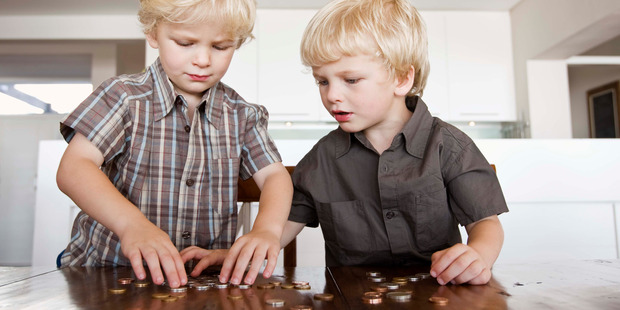Michael Gallagher asked for views on KiwiSaver, NZ Herald

Tamsyn Parker
Money Editor for NZ Herald
Should you still sign kids up to KiwiSaver?

Enrolling children in KiwiSaver can help teach them about saving. Photo / Thinkstock
Parents would be financially better off paying down their mortgage or other debts than signing their children up to KiwiSaver now the $1000 incentive has been canned, say financial experts.
But others argue it still has a place in teaching children about saving and setting them up for a house or retirement in the future.
On Thursday finance minister Bill English removed the $1000 kick-start from KiwiSaver effective immediately meaning children are no longer eligible for any incentives.
The $521 tax credit which the government contributes to KiwiSaver is only available to savers who are 18 years and over.
Liz Koh, principal of Wellington based financial advice firm Money Max, said the $1000 had been a good marketing tool.
“It was an enticing carrot in the early days of KiwiSaver when there was considerable sceptism about the Government’s intentions with KiwiSaver and the benefits of being enrolled.”
“Many parents signed up their children simply to get a free handout.”
Koh said termination of the kick-start would put an end to that and she believed that was a good thing.
“Committing your child to a lifetime of KiwiSaver membership without their knowledge or understanding takes away their freedom of choice and teaches them little about how to make good financial decisions.”
Mark Lister, head of rearch at Craigs Investment Partners, said he had signed his two children up to KiwiSaver to get the $1000 before the change but if he hadn’t done so he probably wouldn’t be bothered doing it now the incentive had been taken away.
Lister said that KiwiSaver was positive in that it could instill a long term savings culture in them and start a good habit of saving but voluntary contributions for children also diverted money away from repaying the mortgage or other debt faster.
“While that obviously doesn’t do anything for building a long-term savings culture in the children, it is arguably better from the financial perspective of the family unit as a whole.”
Michael Gallagher, an authorised financial adviser with Financial Advice Hawkes Bay said he believed it was still useful to sign children up to KiwiSaver as a saving education tool.
“I’m a big promoter of financial education.”
It was also a big help for getting on to the property ladder.
“The property issue is not going away any time soon. People still need to find the money for a deposit.”
“If you talk to people buying their first home they say they wouldn’t be owning a house if they hadn’t got into KiwiSaver.”
But it required parents or others to contribute money into the fund regularly.
“It would need to be $10 on a weekly basis to justify it. The $1000 just isn’t there to provide a buffer now.”
Gallagher said many of his clients had signed up their children to KiwiSaver but did not contribute to the scheme.
“They have done it just to get $1000. The majority are not saving or contributing to KiwiSaver.”
The most common reason people did not contribute was tight finances.
He said often it was money which people typically put aside in a saving’s account which went into KiwiSaver instead.
The flipside with KiwiSaver was that you could not get the money out for education or other needs and it did not offer capital preservation like a bank account did.
However signing the kids up would stand them in good stead once they began working.
At the end of the day it came back to what people could afford and people needed to prioritise their debts, he said.
May 27, 2015